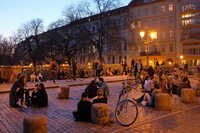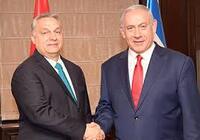Arnon Grunberg's Blog, page 19
April 8, 2025
Beach
 Actions
ActionsOn another kind of D-Day – Oren Cass in NYT:
‘Last week’s “Liberation Day” marked a kind of D-Day in the effort to reorder the international economic system. That reordering is desperately needed to address the system’s imbalances, which have led to deindustrialization and annual trillion-dollar trade deficits for the United States. But remember, far from striking World War II’s decisive blow, D-Day was just the start of the European campaign. Eleven months of vicious fighting followed, with more than 100,000 Americans killed before victory was secured. With the tariffs, too, success or failure depends on what happens next, and the nation will have to bear real costs while the outcome hangs in the balance.
The breadth, speed and severity of President Trump’s actions, which he finalized only shortly before the Rose Garden announcement, sparked immediate panic across markets and among allies. The airwaves filled with dire predictions as people scrutinized the sources and sizes of the numbers, the strategy and even the legal authority. Amid the hysteria, fair concerns have also emerged about what the plan lacks: time for companies and governments to respond, permanence for those tariffs intended to shift investments and a clear vision of the goals and how to reach them. But there are simple steps the administration could take now to correct course and move from its embattled beachhead into a sustainable forward position.’
(…)
‘For the many trading partners that have come forward to negotiate, little would be lost and much saved if Mr. Trump thanked them with a six-month grace period in which to bring their best offers to the table. Those who fail to deliver could be hit with half the Rose Garden tariff rate and be given six more months to get it right before the full weight lands.’
(…)
‘The first days of a war are rarely determinative of its outcome, and even the best plan changes when it meets the real world. Leaders get the opportunity to prove their mettle in those moments when they must adapt under fire to better pursue an unwavering goal. For Mr. Trump, the battlefield awaits.’
Read the article here.
Ah, this is a war.
Also, there is one powerful, and many powerless.
But power tends to be fluid.
A ‘six-month grace period’?
This administration believes that its allies are dead men walking.
April 7, 2025
Assets
 Sales
SalesOn signs - The Economist:
‘There are ominous signs. The Financial Times reports that several Wall Street banks have hit their hedge-fund clients with the biggest margin calls since 2020, meaning they must stump up cash to cover their losses. Over the past three trading days American share prices have plummeted almost as fast as they did then, when the onset of the covid-19 pandemic shuttered much of the global economy. Concerningly, even the gold price dropped sharply in the days after Mr Trump’s announcement. Since gold is usually seen as a hedge against disaster, this sort of move suggests fire sales, with traders having to offload their most liquid assets to meet margin calls. On April 7th the price of ten-year Treasury bonds, another usual haven, fell as well.’
(…)
‘In different circumstances, investors would expect central bankers to slash interest rates in an attempt to loosen financial conditions and offset the hit to economic growth. Instead, on April 4th Jerome Powell, the Federal Reserve’s chairman, suggested that the Fed would “wait for greater clarity”. Consumers and market participants alike already expect Mr Trump’s levies to raise inflation; for the central bank to cut rates too quickly would risk more self-fulfilling worries of the runaway sort.’
Read the article here.
It’s not the end of the world, as long as future historians won’t conclude that Liberation Day in the US was the beginning of the new great war.
As to self-fulfilling prophecies: consumers will consume, that’s wat they are consumers, but sometimes their credit cards prevent them from consuming.
When this happens to many consumers at the same time, well that’s when the the shit hits the fan.
Paradise is credit without limits. In theory at least.
April 6, 2025
Use
 Agenda
AgendaOn the big plan – Amir Tibon in Haaretz:
‘Two months ago, Benjamin Netanyahu's government was on the verge of collapse. The far-right, messianic elements of his governing coalition were threatening to leave the government because he had agreed, under heavy pressure from the United States, to enter a temporary cease-fire deal in order to allow the return of some Israeli hostages from Gaza. The ultra-Orthodox parties, meanwhile, were threatening to do the same unless Netanyahu agreed to promote a deeply unpopular bill to exempt their voters from military service.
Things looked hopeless for Netanyahu, until the prime minister arrived in Washington for a meeting with U.S. President Donald Trump. During that meeting, Trump presented his plan to forcibly expel the entire Palestinian population of Gaza; Netanyahu then returned to Israel with a big promise to dangle in front of his wavering coalition partners. If you bring down this government now, he warned them, Israel will go to an early election, and the opportunity to implement Trump's big plan for Gaza will be lost forever. The government survived, passed a state budget, and seems certain to hold onto power for at least a year now.’
(…)
‘Which leads us back to Washington, where he is scheduled to meet Trump on Monday for a short visit that was hastily arranged last week, after the two men spoke on the phone during Netanyahu's lavish, four-day vacation in Budapest. Netanyahu, according to his office, raised the issue of Trump's tariffs, including the 17 percent tax his administration announced it would place on all imports from Israel. In response, Trump invited Netanyahu to the White House, and that's how the meeting came to be.
For Netanyahu, this is another opportunity to change the public agenda in Israel – and to use Trump to rescue himself from the storm surrounding him. He may even ask Trump to make a public statement against the investigations that are hounding him, and the two will together denounce the so-called "deep state" behind them.
One question will remain unanswered, just like after Netanyahu's February visit, in which Trump saved him from losing power: What do Trump and the U.S. get in return for bailing out Netanyahu?’
Read the article here.
What he US i.e. Trump will get in return? Total submission.
The two men will try to outsmart and outlive each other.
Soon we will know whether the US will lower its tariffs for Israel to zero percent. In return for what exactly?
In the meantime the killing continues. Blaming the so-called eep state continues.
April 5, 2025
Function
 Space
SpaceOn art – Aaron Peck in TLS:
‘One of Eno’s most recent projects, What Art Does: An unfinished theory, co-authored with the Dutch artist Bette A., turns his attention to a general theory about art. A pocket-sized hardcover in white and pink, it seems at first glance to take its ambitions lightly. Inside, amid Bette A.’s playful illustrations, Eno, in a plain-spoken and direct style, attempts a pragmatic yet sophisticated defence, bringing together ideas he has been exploring since the 1990s. While we see that humans everywhere enjoy art, we have little sense of what it actually does, he claims. No wonder some governments marginalize it. To argue for it, he says, we need to understand it.
Eno imagines a continuum from the humblest human activities, such as cutting hair (not how an artist might propose cutting hair as an artwork in a gallery, but actual haircuts), to the most remarkable aesthetic achievements – a symphony, poem or painting. What, according to him, unifies these varied things? They are how we explore feelings. And how does that happen? The further art gets from utility, he argues, the greater freedom it has to explore the range of human emotions: “The art engagement begins where the functional engagement ends.” It’s a rather standard definition advanced since the Enlightenment, to be sure. But what is refreshing about his formulation is that it includes things that are tied to utility without abandoning the autonomy associated with more traditional artforms. Most aesthetic theories claim one or the other, beauty or function; Eno leaves space for both. “Art,” he says, “only happens when there is room for options, where things can be fundamentally otherwise.” He envisions an avant-garde approach that is both generative and inclusive, a general theory for everyone and anyone.’
(…)
‘But what is meant here by “avant-garde”? It’s a word that is often used rather loosely. “The term ‘avant-garde’”, writes Morgan Falconer, “first came into use in Paris at the turn of the twentieth century and pointed to artists who were behaving in distinctly new ways.” His new book, How to Be Avant-Garde: Modern artists and the quest to end art, explores how those artists attempted to destroy a bourgeois understanding of art, replacing it with something that merged with daily life.’
(…)
‘We encounter, for example, the young Filippo Tommaso Marinetti stargazing in Alexandria, years before his return to Italy to champion futurism, the wild bohemian nights of Emmy Hennings and Hugo Ball in Zürich at the birth of Dada, as well as Guy Debord’s drunken dérives across Paris with other members of the Situationist International, smoking hash on the banks of the Île de la Cité. With a talent for setting the scene and rendering vivid portraits, Falconer brings the stories of these artists, each with conflicting agendas, into one comprehensible argument. The lightness of his critical touch does a service, too, because it manages to take a rather theoretically dense premiss, illustrating the radical aims of the historical avant-garde, without recourse to academic jargon.’
(…)
‘In terms of the avant-garde, the boldest ways in which art and life are merging, outside luxury lifestyle branding, can be seen in tech. David Hajdu’s The Uncanny Muse: Music, art, and machines from automata to AI begins from a moment of unease. In February 2019, the music critic attended the opening of Faceless Portraits Transcending Time, an exhibition at HC Contemporary that claimed to be the “first show of algorithmic art in a New York gallery”, a collaboration between a computer science professor at Rutgers University named Ahmed Elgammal and an algorithm he had programmed. For Hajdu, it spurred a number of questions – one being, “How new is this really?” And that led him to explore the extensive history of creativity and automation.’
(…)
‘Reading this book feels a bit like learning how to stop worrying and love the bomb: “Growing in intelligence”, Hajdu writes, “machines may still have more to communicate, if we let them.”The worry is not so much about generative AI changing creativity, however, as about the convergence of widening economic disparity and our reliance on tech – as we risk becoming “techno serfs”, to borrow an idea from Yanis Varoufakis – tethered to our devices, subscriptions and apps while a few huge companies accrue more wealth and power.’
(…)
‘We need a new avant-garde, one that thinks “fundamentally otherwise” from how it has been co-opted. Brian Eno’s “unfinished theory” is a beginning.’
Read the article here.
In order to answer the question, can a machine produce art, we need to answer the question first: what is art?
Art didn’t stop with the birth of Dada, nor with the demise of Dada, to state the obvious.
Room for options, is a pleasant lowest common denominator.
The machine will give us more options. Stop fearing the machine, start loving the machine, and eventually the machine will love you.
I have been told that also my books are used to make AI a better writer.
Well, that’s what happens all the time. The giants of the past make us better writers, which is not to say that I’m a giant.
The new competitor is here to stay.
April 4, 2025
Civilians
 Attacks
AttacksOn staring in your face – Omer Bartov in NYRB:
‘That remote genocide at the dawn of the twentieth century shares some remarkable similarities with the campaign of ethnic cleansing and annihilation prosecuted by Israel in Gaza. Israel saw the Hamas attack of October 7, 2023, in much the same way that the Germans saw the Herero attack 119 years earlier: as confirmation that the militant group was utterly savage and barbaric, that resistance to Israeli occupation would always incline toward murder, and that Gaza’s Palestinian population as a whole should be removed from the moral universe of civilization. “Human animals must be treated as such,” the Israeli major general Ghassan Alian (who is Druze) said shortly after the attack, echoing several other Israeli officials, including former defense minister Yoav Gallant. “There will be no electricity and no water [in Gaza], there will only be destruction. You wanted hell, you will get hell,” Alian said in an Arabic-language video message directed to Hamas as well as the residents of Gaza. Over the next seventeen months Israeli forces killed more than 50,000 Palestinians, over 70 percent of whom are estimated to have been civilians, maimed well over 100,000, and imposed on the remaining population conditions of inhuman deprivation, suffering, and pain. A cease-fire that went into effect on January 19 ended abruptly on March 18, when Israel refused to move on to the second phase of its agreement with Hamas and launched a series of unilateral attacks that have already killed hundreds more Palestinian civilians.’
(…)
‘In a poll conducted in Israel in May 2024, more than half the respondents said that the Hamas attack could be compared to the Holocaust.
The genocide of the Herero was part of the murderous violence to which European colonizers subjected indigenous populations the world over. As Aimé Césaire wrote in 1950, white Europeans paid notice only when Hitler “applied to Europe colonialist procedures which until then had been reserved exclusively for” colonized populations elsewhere. They had “tolerated that Nazism…absolved it, shut their eyes to it, legitimized it”—until it came to them as a choc en retour under Nazi rule.
It is a different matter whether Césaire’s disciple Frantz Fanon was correct when he suggested that, though surely “the Jews are harassed…hunted down, exterminated, cremated,” their genocide could nonetheless be summed up as nothing more than “little family quarrels,” a case of whites murdering whites. Quite apart from the millions of Jews with non-European backgrounds, even Jews of European descent were, and to some extent still are, not as white as other whites, and their whiteness, for whatever it’s worth, may be tenuous and conditional, as Rachel Shabi notes in Off-White. Even as many “European-Jewish communities…have been folded into white majorities across the West,” she argues, “there is a lingering ambivalence.” The very fact of having been “separate at first and subsequently soaked up into the defining majority” makes Jewish whiteness feel “contingent and attenuated.”’
(…)
‘And when “never again” becomes not just a slogan but part of a state ideology, when it becomes the prism transforming every threat, every security issue, every challenge to the state’s legitimacy or righteousness into an existential peril, then no holds must be barred to defend those who have already faced annihilation. It is a worldview, Beinart writes, that “offers infinite license to fallible human beings.”Once Hamas militants are seen as modern-day Nazis, Israel can be imagined as an avenging angel, uprooting its enemies with fire and sword. During my childhood and youth in Israel, the Holocaust was a symbol of shame and denial, an event in which Jews went like sheep to the slaughter. Over the years, as I have grown older, it has become something else entirely: a story of solidarity, pride, and Jewish heroism. It is this sense of “never again” that permits most Jewish Israeli citizens to see themselves as occupying the moral high ground even as they, their army, their sons and daughters, and their grandchildren pulverize every inch of the Gaza Strip. The memory of the Holocaust has, perversely, been enlisted to justify both the eradication of Gaza and the extraordinary silence with which that violence has been met.’
(…)
‘What, then, was the difference between creating a state for the Jews and creating a Jewish state? In his provocative study To Be a Jewish State, Yaacov Yadgar argues that in certain respects these are “two distinct, contesting, and even contradictory political projects.” A Jewish state is one whose character is defined through Judaism, whereas a state for the Jews is simply one with a majority-Jewish population, defined ethnically rather than by its relationship to the Jewish religion. The state envisioned by the founder of political Zionism, Theodor Herzl, would be liberal and could be secular. A Jewish state, on the other hand, would profess the Jewish religion as the very essence of its identity.’
(…)
‘One afternoon in early December 2024 I was sitting with a friend of many decades at a popular café facing the Habima Theatre in Tel Aviv. I looked around the busy café and asked, “What does a society engaged in genocide look like?” “Like this,” we agreed. Some of the younger men and women sipping espressos may have just come back from service in Gaza or Lebanon. Some may have lost friends or family on October 7 or in the subsequent fighting. They had all been subjected to air-raid sirens in the middle of the day or while fast asleep. On the surface, however, everything looked excruciatingly normal, even though Gaza was only forty-five miles south.’
(…)
‘Another person told me, “If the IDF were to kill a thousand dogs in Gaza, it would cause greater public uproar than the mass slaughter of human beings.”’
(…)
‘The long-term consequence of this travesty may, however, be that the genocide in Gaza will finally liberate Israel of its status as a unique state rooted in a unique Holocaust. This will hardly help the tens of thousands of Palestinian victims or the victims of the Hamas massacre, the dead and dying hostages or their broken families. But the license that Israel, the land of the victims, has long enjoyed and abused may be expiring. The sons and daughters of the next generation will be free to rethink their own lives and future, beyond the memory of the Holocaust; they will also have to pay for the sins of their parents and bear the burden of the genocide perpetrated in their name. They will have to reckon with what the great, often forgotten Israeli poet Avot Yeshurun wrote in the aftermath of the Nakba, of which we are witnessing a repetition, or continuation: “The Holocaust of the Jews of Europe and the Holocaust of the Arabs of Eretz Israel are one Holocaust of the Jewish people. The two of them stare each other directly in the face. It is of this that I speak.”’
Read the article here.
Yes, the killing of mass killing of dogs in Gaza would cause more uproar.
Avot Yeshurun died in 1992.
Today, I’m even less sure than I was in 1992, that the Jewish people and the Israeli people are the same, I do think that Zionism i.e. the state of Israel will create a schism in Judaism.
But perhaps, out of the ashes of the Shoah came the new Germany into existence, perhaps out of the dead bodies of the Palestinians the new Israel will come into existence.
Perhaps.
But it’s also possible that those Israelis who are interested in a new Israel have since moved to Berlin.
Next year in Berlin? A new Israel in Berlin, or east of Berlin?
April 3, 2025
Partner
 Nonsense
NonsenseOn Liberation Day – The Economist:
‘Mr Trump called it one of the most important days in American history. He is almost right. His “Liberation Day” heralds America’s total abandonment of the world trading order and embrace of protectionism. The question for countries reeling from the president’s mindless vandalism is how to limit the damage.’
(…)
‘On economics Mr Trump’s assertions are flat-out nonsense. The president says tariffs are needed to close America’s trade deficit, which he sees as a transfer of wealth to foreigners. Yet as any of the president’s economists could have told him, this overall deficit arises because Americans choose to save less than their country invests—and, crucially, this long-running reality has not stopped its economy from outpacing the rest of the g7 for over three decades. There is no reason why his extra tariffs should eliminate the deficit. Insisting on balanced trade with every trading partner individually is bonkers—like suggesting that Texas would be richer if it insisted on balanced trade with each of the other 49 states, or asking a company to ensure that each of its suppliers is also a customer.’
(…)
‘As stockmarket futures tumbled, shares in Nike, which has factories in Vietnam (tariff: 46%) fell by 7%. Does Mr Trump really think Americans would be better off if only they sewed their own running shoes?’
(…)
‘One question is whether to retaliate. Politicians should be cautious. Pace Mr Trump, trade barriers harm those who put them up. Because they are more likely to cause Mr Trump to double down than retreat, they risk making things worse—possibly catastrophically so, as in the 1930s.’
Read the article here.
Again, I do believe Mr. Trump is punishing his fellow Americans because they don’t deserve his enlightenment.
They will have to go through darkness first, in order to see the light. It’s all very biblical.
Out of prudence, I cannot answer the question here whether Mr. Trump is a false or a true prophet.
The future will tell.
In the meantime we should try to live with the real existing prophets or move to Montreal.
April 2, 2025
Up-to-date
 Human bodies
Human bodiesOn death and Ernest Becker - J.M. Cameron in NY Books, half a century ago:
‘For some years now people have been saying that death is to us what sex was to the Victorians, suppressed as a topic in ordinary society, repressed as a future certainty by most people most of the time, something children should be shielded from, for they are not to be admitted to the bedside of the dying or allowed to see dead human bodies and they are told stories about death analogous to the stories that used to be told, perhaps still are told in prim circles, about gestation and birth. Death is now prettified out of existence by the relentless and mendacious undertaking industry, with its euphemisms (“casket,” “passed away,” “loved one”) and its painting and mummification of the corrupting body so that it may appear to be something else. After all, sexual repression hasn’t been abolished by frankness in talk, and it may be that the repression of the thought of death is not altogether separable from sexual repression. The interest we have in necrophilia, and the repugnance we at the same time have for it, are both evident. Stories about the English necrophile Christie, who strangled women in order to copulate with them, are eagerly read. So far as I know such acts have not yet been performed on the screen or mimicked in the theater, but my information may well not be up-to-date.’
(…)
‘Finally, the phenomenon of death has in our time become bizarre. Auschwitz and Treblinka, Kolyma and Vorkuta, Dresden and Hiroshima and Nagasaki, these are names that represent terrible, uncanny realities that are nevertheless unbelievable and inconceivable. They raise perplexing questions about the nature of our time, questions that are at the same time about death and its meaning—or its absurdity—for us.’
(…)
‘About the deaths of others we sometimes seem to feel differently, especially about such deaths as are attended with great suffering, and we may even say (or, if we no longer say it, we see its point): Those whom the gods love die young.’
(…)
‘Life, for Becker, is a desperate business, in which a steady heroism before the terrors of existence is in general the only thing to be commended. The side of Freud he admires most is his grim honesty. He reminds us that Freud said that “he cured the miseries of the neurotic only to open up to him the normal misery of life.”’
(…)
‘Becker doesn’t think there are any tricks, certainly there is no assured therapy, to make the terror of existence go away. The kind of person we call “balanced” or “well-adjusted” has, it is true, at least for a time, so organized his repressions and balanced the resulting neuroses that he may seem a living refutation of the universality of existential terror. But the beguiling surface conceals horrors: vampirism (living off the substance of others); psychosomatic illnesses; bad dreams; jealousies; aggression. But isn’t there, if not a way of overcoming the fundamental situation of man, at least a position to be adopted, a disposition to be cultivated, an attitude that rests upon truth? Becker’s answer is not to me perfectly clear. He seems to want to say two things. First, heroism is to be commended; the world is, in William James’s phrase, “a theater for heroism.” Not to be a hero (compare Péguy’s “not to be a saint”) is the saddest failure. Freud is a fine example of the heroic; bereaved, in exile, betrayed (as he thought) by so many, a cancerous jaw, yet working, working up to the end. Then, he finds certain possibilities roughed out by religion.
There is a driving force behind a mystery that we cannot understand, and it includes more than reason alone. The urge to cosmic heroism…is sacred and mysterious and not to be neatly ordered and rationalized by science and secularism.
A wonderful, rich, ramshackle book. I’m not sure in what way it is appropriate—if it is—that the author died shortly after his book was published. But for those who would wish to go on with the conversation it is a severe loss.’
(…)
‘It is true that the Judaism of the earliest strata of the Old Testament is unique among religions in not seeming to raise the question of individual survival as a distinct problem. But in later Judaism, in the Hasidic tradition, in the prayers to be said by the dying, the question about survival is not answered ambiguously.
In the last document in the book [Jewish Reflections on Deathedited by Rabbi Jack Riemer], the reproduction of an “ethical will” written in recent years, we find the following. First, there is a slightly joking passage in which the writer, after saying that he hopes to live to see all his children happily married, adds: “if not, I’ll be watching from somewhere anyway.” Later, he writes: “To us as Jews, life is its own raison d’être, its own self-justification; we await neither heaven nor hell.” Again: “the only immortality I seek is that my children and my children’s children be good Jews, and thereby good people.” But compare this with what we find in the earlier tradition.
The Rabbi of Berditchev said before he died that when he arrived up there he would not rest nor be silent, nor would he allow any of the holy ones to rest or be silent until the Messiah should come. But when he came there the beauties and wonders of heaven overwhelmed him, so that he forgot about this.’
(…)
‘For most men such considerations make the hypothesis of survival impossibly difficult. If it were easy, if dying were like going to the mountains in the hot weather, death would not be terrible. On the contrary hypothesis, that to die is to become nothing, death can’t be terrible either, for there was a time when I was not, and this doesn’t shake the mind—does it? But death is terrible with a sacred terror that is simply a datum of the human condition; and for the dying and the dead there is a reverence that belongs to natural piety, just as there is a reverence of a like kind for human sexuality. If we were to come to find such reverence a clog upon our freedom, something that doesn’t go with intellectual enlightenment, we had better look forward to a society in which the bodies of the dead are put out with the garbage. Would there then be an Antigone to confront the sanitary regulations?’
Read the article here.
Cure extraordinary misery, embrace normal misery, that’s happiness according to Freud. I can only agree with him.
After all, the grim outlook is the cheerful outlook.
Becker’s book is still one of the finest I’ve ever read on the human condition.
Most of us don’t know how to die, but we do it anyhow. That’s a small comfort, just slightly bigger than the comfort of eternal life. Who wants eternity on this planet?
As to the joke about the Messiah: He should be forgotten.
Culture is a hero-system, according to Becker, I would say that we cannot give up trying to become heroes, we might just do it with a sense of self-irony.
Instead of waiting for the Messiah, become your own Messiah.
Local messianism. Messianism in the bathroom. Outside the bathroom it becomes dangerous right away.
April 1, 2025
Tariffs
 Relations
RelationsOn an army for hire – David E. Sanger in NYT:
‘Ivo Daalder, a former U.S. ambassador to NATO, wrote recently that the clear conclusion other countries can reach from the chat is “apparently, the U.S. military is for hire, even if there has been no request for its services.”“And if you want us — you have to pay,” he continued.
Somewhat remarkably, Mr. Trump’s national security officials are acting as if all is normal, as if their boss is not upending the system. On Thursday, a day after Mr. Trump is expected to announce the tariffs, Secretary of State Marco Rubio will represent the United States at a long-scheduled NATO meeting that will be heavily focused on the war in Ukraine.
He will have to navigate the resentments of fellow foreign ministers, most of whom argue, largely in private, that the United States is making a fundamental error by seeking to normalize relations with Russia — rather than contain it and punish it for invading Ukraine — and that it is seeking to hobble their economies. (Occasionally these leak out: Justin Trudeau, before he left office as prime minister of Canada, told a Canadian audience that Mr. Trump was attempting “a total collapse of the Canadian economy because that will make it easier to annex us”.)’
Read the article here.
The army is for hire, but the annexation of Canada comes first. Or is it the annexation of Greenland?
And it’s still possible that Ukraine will pay enough. Or that Putin will pay more.
The historians of the future will have a good laugh with our times. If they have a sense of humor.
Tarriffs
 Relations
RelationsOn an army for hire – David E. Sanger in NYT:
‘Ivo Daalder, a former U.S. ambassador to NATO, wrote recently that the clear conclusion other countries can reach from the chat is “apparently, the U.S. military is for hire, even if there has been no request for its services.”“And if you want us — you have to pay,” he continued.
Somewhat remarkably, Mr. Trump’s national security officials are acting as if all is normal, as if their boss is not upending the system. On Thursday, a day after Mr. Trump is expected to announce the tariffs, Secretary of State Marco Rubio will represent the United States at a long-scheduled NATO meeting that will be heavily focused on the war in Ukraine.
He will have to navigate the resentments of fellow foreign ministers, most of whom argue, largely in private, that the United States is making a fundamental error by seeking to normalize relations with Russia — rather than contain it and punish it for invading Ukraine — and that it is seeking to hobble their economies. (Occasionally these leak out: Justin Trudeau, before he left office as prime minister of Canada, told a Canadian audience that Mr. Trump was attempting “a total collapse of the Canadian economy because that will make it easier to annex us”.)’
Read the article here.
The army is for hire, but the annexation of Canada comes first. Or is it the annexation of Greenland?
And it’s still possible that Ukraine will pay enough. Or that Putin will pay more.
The historians of the future will have a good laugh with our times. If they have a sense of humor.
March 31, 2025
Shift
 Demonization
DemonizationOn a new alliance - Liza Rozovsky in Haaretz:
‘Yonathan Arfi, head of the Representative Council of the French Jewish Institutions, commonly known as CRIF, feels this predicament acutely. Solidarity with Israel guides the umbrella organization's activities, and it carefully avoids criticizing the country, especially publicly, with extremely rare exceptions. Initially, the organization remained silent in the face of reports of the Foreign Ministry's policy change toward the National Rally. However, Arfi broke this custom when speaking with Haaretz, saying that because the Israeli policy shift didn't provoke especially strong reactions in France, the council chose to refrain from making noise – though its position remains unchanged.
"We don't see how this benefits Israel," Arfi says. "But we clearly see how it harms French Jewry – by fueling the demonization of both Jews and Israel through their association with Europe's far right." CRIF conveyed this message to Israeli Ambassador Joshua Zarka.’
(…)
‘In today's Israeli diplomacy, a party's antisemitic past – or even Nazi roots – is no longer the deal-breaker it once was. Nor is Israel particularly fussy on broader moral grounds. Islamophobic or homophobic views, or racist rhetoric, are no longer grounds for automatic disqualification. Some Foreign Ministry officials even argue that Le Pen's party no longer fits the "far right" label.
Indeed, comparing the party's immigration positions to Israeli standards, Israeli views often appear more extreme. For example, the National Rally has long fought to give French citizens priority in welfare benefits and subsidized housing over foreigners, while in Israel, providing basic medical care to Ukrainian war refugees was considered an almost unprecedented act of government charity.’
(…)
‘When a right-wing government with minimal ideological differences from Europe's extreme right parties holds power in Israel, this dilemma hardly seems to exist. Regarding quiet contacts with European right-wing populist parties, even experts agree it's the logical move.’
(…)
‘"It's hard to generalize about Spain's Jewish community," Gonzalez concludes. "But it's true that some have publicly backed Vox because of its unconditional support for Netanyahu. I think they fail to see that these parties champion a uniform, homogeneous vision of society – one that conflates national identity with religion and culture. That's a worldview incompatible with respect for minorities, including Jews."’
Read the article here.
For the state of Israel, the Jews outside Israel are considered collateral damage, especially if you haven’t made it on time to the Holy Land.
Of course, unholy alliances existed before, Israel has an extreme-right government, why not support the extreme-right in Europe? They have a common enemy after all. But this is one of the more unholy alliances thinkable.
Judaism being torn apart by Messianism once again.
Arnon Grunberg's Blog
- Arnon Grunberg's profile
- 415 followers



